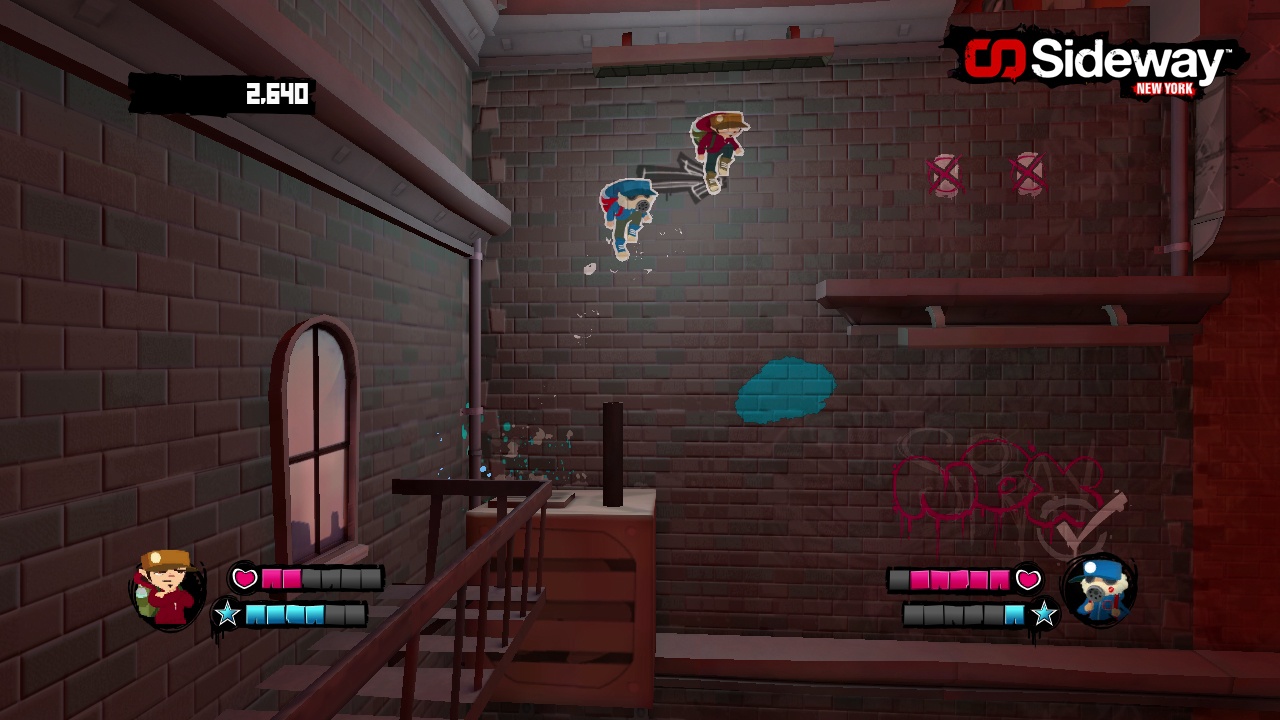Like the best complex graffiti pieces that are painstakingly applied to brick walls and train cars, there's a lot going on in Sideway: New York. At first glance, it looks both stylish and simple. You know this type of game--platformers have been around since the dawn of video games--but you've never seen one quite like this. Sideway is a modern platformer in every sense of the word, infused with classic jumping challenges and light combat. It’s a progressive, if small, step forward for the genre. You play as Nox, a New York City artist, who gets sucked into a graffiti world by an evil little guy named Spray. In Bowser-like fashion, Spray has captured Nox's girlfriend, Cass, because that's what evil guys do. Apparently Spray wants to ditch the graffiti world and live in three dimensions, and he needs Nox's acquired powers to do it. The story isn't very involved, but it sets up the premise of the game and its crazy visual style nicely. In the 2D graffiti world, you're bound to flat surfaces; a moving picture slipping from wall to wall. Although it might look like some kind of insane perspective-shifting puzzle game, Sideway is a platformer first and foremost--a good one.
A simple subway-station-inspired map ushers you through a dozen or so levels and a handful of boss fights. The game eases you in to the perspective shifts with simple platform jumping and enemy punching, but your repertoire expands quickly. New abilities come often, which means new challenges are just around the corner, literally. You pick up a slide move, a double jump, a shoulder bash, a paint grenade and more. Many of the abilities pull double duty, aiding you in traversal and combat. Your slide move can help you squeeze under obstacles, and also stun some enemies, allowing you to follow up with a quick three hit punch combo. Because the new abilities are so effective, their rapid rollout is never overwhelming. The last few levels have you intuitively transitioning between combat and platforming--from grapple swing to jump kick to ground pound--all while the environment spins about. You can even go back to some of the earlier levels with your new moves to reach secret collectibles. The controls are on the loose and floaty side, and there are a few tricky spots that may have you wishing for something more precise. But on the whole, Sideway offers a solid succession of satisfying platforming challenges.
The first time you see the perspective shift as your 2D character walks around a 3D wall, you might experience a bit of vertigo. It can take a few minutes of focus to figure out what your 2D character can or cannot move on and to train your brain to see the buildings as flat playing surfaces. Once you do, you'll be shifting perspectives on the fly as you jump from walls to roofs and back. In a few instances, you can even force the perspective to shift a different way by jumping onto an adjacent flat surface. There's some light puzzle platforming in the form of block pushing, but generally you only need to force the perspective to shift a different way if you're looking for secret collectibles, of which there are many. Still, it's a novel--and sometimes dizzying--effect that never loses its charm.
The visual treat doesn't end with the mind-bending perspective shifts. Everything about the presentation in Sideway oozes style. The exaggerated New York cityscape provides a colorful and diverse backdrop for the expressive, expertly animated 2D characters. The fluid movement and outlandish design of the characters make them feel less like characters designed for a video game and more like cartoon graffiti images that have come to life. This game is crammed with vivid details, and the stunning visuals are something you have to see in motion to truly appreciate.

Unfortunately, Sideway sprays outside the lines in a few spots. The aforementioned floaty controls can lead to some unfair deaths, especially on the rare occasion when the frame rate dips. Early on, you're given tips on how to take out the new enemies you encounter, but for some reason, the game stops supplying those helpful hints later on. Though enemies are designed and animated with wonderful flair, it's not always clear how they should be taken down just by looking at them. As a result, there are some enemies that you’ll have to figure out through trial and error. Thankfully checkpoints are liberally scattered throughout each level. Finally, while the hip-hop-infused music sounds good, there's not enough of it. You hear the same half-dozen Skullcandy headphone sponsored tracks repeated endlessly throughout the game.
Even with slight blemishes, Sideway: New York is worth every penny of the $10 asking price. The campaign can be cleared out in about four hours, but you can easily wring out a few more if you go back for collectibles. You can also play through the entire game with a friend in local co-op, but the rapid perspective shifts can make staying together difficult. This is a game best played on your own, though the impressive visuals make it worth watching for others. With a big fat endgame teaser for more, Sideway: New York looks to be a solid start to a visually impressive series.